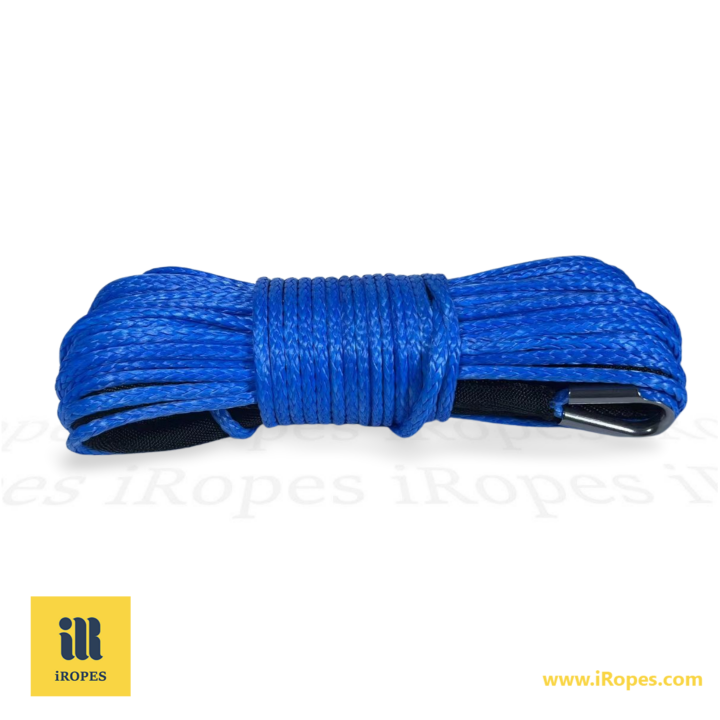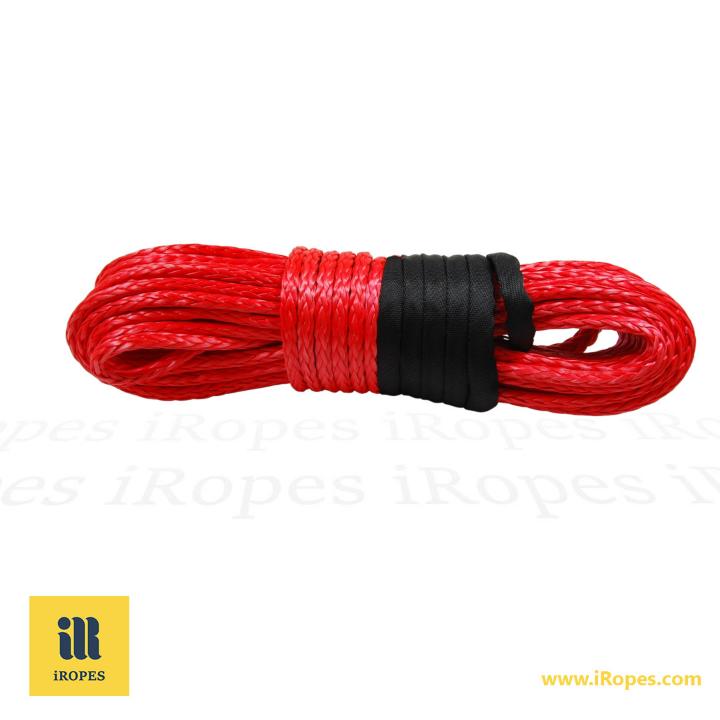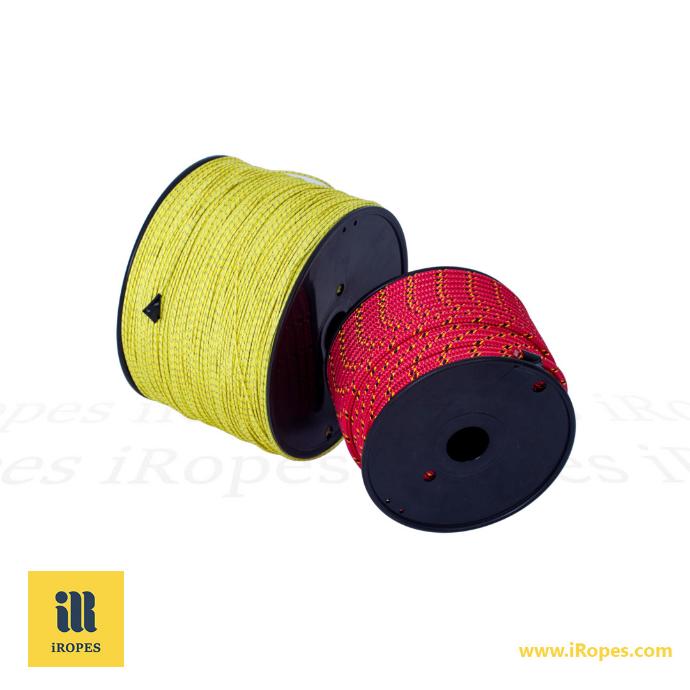Ever wondered why a 1 inch diameter rope might be perfect for your sailboat, while a 4 inch behemoth is essential for mooring an oil tanker? In the world of ropes, size isn't just a number—it's the difference between success and failure, safety and danger.
At iRopes, we've seen firsthand how choosing the wrong rope diameter can lead to disastrous consequences. That's why we're passionate about helping you select the right diameter rope for your needs. Whether you're scaling mountains, securing heavy machinery, or rigging a yacht, the perfect rope is out there—and we're here to help you find it.
This line is easy to splice constructed with high performance UHMWPE
fibers, ideally suit for all applications involving high breaking loads, low
stretch, minimal creep and excellent UV resistance.
MATERIAL: UHMWPE
CONSTRUCT: 12-strand
ELONGATION: 4.8%
In this guide, we'll unravel the mysteries of rope diameters, exploring everything from versatile 1 inch ropes to specialized 4 inch giants. We'll dive into the factors that influence rope selection, the applications of various sizes, and how our comprehensive range of HMPE, nylon, Technora, and polyester ropes can meet your unique requirements.
So, are you ready to discover how the right rope diameter can revolutionise your project? Let's dive in and find the perfect match for your needs.
Understanding Factors Influencing Rope Diameter Selection
When it comes to choosing the right rope for your project, diameter is a crucial factor that can make or break your success. Let's dive into the key considerations that influence rope diameter selection, ensuring you make an informed decision that prioritises both performance and safety.
Key Considerations for Choosing Rope Diameter
As someone who's spent years working with ropes in various applications, I've learned that selecting the appropriate diameter is more of an art than a science. It's about finding that sweet spot where functionality meets safety requirements. Here are the primary factors you need to keep in mind:
- Application and intended use: Are you rigging a sailboat or securing a heavy load? The purpose of your rope will greatly influence the diameter you need.
- Load capacity and weight requirements: Bigger isn't always better. You need to balance the strength required with the practicality of handling the rope.
- Safety considerations and regulations: Different industries have specific safety standards. Always check the relevant guidelines for your application.
- Environmental conditions: Will your rope be exposed to harsh sunlight, saltwater, or abrasive surfaces? These factors can affect your diameter choice.

Impact of Rope Diameter on Performance and Safety
The diameter of a rope isn't just about its size – it's a key determinant of its performance characteristics. Here's how diameter affects various aspects of rope functionality:
- Strength and durability: Generally, a larger diameter means higher breaking strength. However, this relationship isn't always linear.
- Weight and handling: Thicker ropes are heavier and can be more challenging to manipulate, especially in applications requiring frequent adjustments.
- Flexibility and knot-tying: Smaller diameter ropes tend to be more flexible and easier to tie, which can be crucial in certain scenarios.
- Wear resistance: Larger diameter ropes often have better abrasion resistance, which can extend their lifespan in harsh conditions.
Remember, the relationship between sheave diameter and rope diameter is critical. A general rule of thumb is to maintain a minimum 18:1 ratio of sheave diameter to rope diameter. This helps prevent premature wear and ensures smooth operation.
Have you ever encountered a situation where the wrong rope diameter caused issues? I once witnessed a sailing mishap where an undersized halyard led to a dangerous situation mid-race. It's experiences like these that underscore the importance of proper diameter selection.
Always err on the side of caution when selecting rope diameter. It's better to have a slightly oversized rope than one that's too small for the job.
At iRopes, we understand the complexities of rope diameter selection. That's why we offer a comprehensive range of diameters in materials like HMPE, nylon, Technora, and polyester. Our expert team is always ready to help you navigate these choices, ensuring you get the perfect rope for your specific needs.
So, next time you're faced with the task of choosing a rope, take a moment to consider these factors. Your safety and the success of your project may depend on it. Have any questions about rope diameter selection? Don't hesitate to reach out – we're here to help!
Common Rope Diameters and Their Applications
When it comes to ropes, size truly matters. The diameter of a rope plays a crucial role in determining its strength, flexibility, and suitability for various tasks. Let's dive into the world of rope diameters and explore how different sizes cater to diverse needs.
Understanding Rope Diameter Measurements
Before we delve into specific applications, it's essential to know how to measure rope diameter accurately. Here's a quick guide:
- Use a calliper: This is the most precise method. Measure across the widest part of the rope.
- Wrap around method: Wind the rope tightly around a cylindrical object, measure the length covered by 10 wraps, and divide by 10π.
- Visual comparison: Compare your rope to objects with known diameters, like coins or drill bits.
Remember, factors like tension and wear can affect a rope's diameter over time. Always measure at multiple points for accuracy.

Applications for Different Rope Sizes
Now, let's explore some common rope diameters and their typical uses:
1 inch diameter rope: Versatile for various applications
A 1-inch (25.4mm) rope is a powerhouse in the world of cordage. It's thick enough to handle significant loads yet still manageable for many applications. You'll often find these ropes in:
- Marine environments: Used for mooring large boats and ships.
- Construction sites: Ideal for heavy lifting and securing large loads.
- Outdoor adventure parks: Perfect for zip lines and climbing structures.
3 inch diameter rope: Heavy-duty use and industrial applications
When you need serious strength, a 3-inch (76.2mm) rope is your go-to choice. These behemoths are typically used in:
- Oil rigs: For anchoring and towing operations.
- Large ship mooring: Capable of securing massive vessels.
- Heavy machinery towing: When standard tow ropes just won't cut it.
4 inch diameter rope: Specialized use cases requiring immense strength
A 4-inch (101.6mm) rope is not something you'll encounter every day. These giants are reserved for truly specialized applications:
- Ultra-heavy lifting: In industries like mining or large-scale construction.
- Deep-sea operations: For tasks requiring extreme tensile strength underwater.
- Massive ship mooring: When dealing with the largest vessels on the planet.
Other common diameters and their specific uses
While we've covered the extremes, there's a whole world of rope diameters in between. Here's a quick rundown:
- 6-8mm: Ideal for climbing accessories and light-duty tasks.
- 10-12mm: Perfect for climbing ropes and general-purpose use.
- 14-16mm: Great for sailboat rigging and medium-duty applications.
- 18-22mm: Suitable for heavy-duty tasks in construction and marine environments.
Always remember that rope strength isn't solely determined by diameter. Material properties, construction method, and intended use all play crucial roles in selecting the right rope for your needs.
At iRopes, we understand that choosing the right rope diameter is crucial for your project's success. That's why we offer a comprehensive range of diameters in materials like HMPE, nylon, **Technora**, and polyester. Whether you're rigging a sailboat or securing heavy machinery, we've got you covered.
Have you ever used a rope that was too thin or thick for the job? Share your experience in the comments below – we'd love to hear your stories and help you find the perfect rope for your next project!
iRopes' Extensive Range of Rope Diameters and Materials
When it comes to finding the perfect rope for your project, one size definitely doesn't fit all. That's why at iRopes, we've developed a comprehensive range of rope diameters and materials to cater to every possible need. From the thinnest cordage to the thickest hawsers, we've got you covered.
Customizing Your Perfect Rope: Diameter and Material Options
Our rope diameter range spans from a hair-thin 0.3mm all the way up to a massive 60mm and beyond. But it's not just about size - the material matters just as much. Let's dive into some of our most popular options:
- HMPE (High Modulus Polyethylene) ropes: Lightweight yet incredibly strong, these ropes are perfect for applications where every gram counts. I've seen climbers scale seemingly impossible cliffs with these babies!
- Nylon ropes: Known for their durability and stretch, nylon ropes are the go-to choice for dynamic applications. They're like the shock absorbers of the rope world.
- Technora ropes: With an exceptional strength-to-weight ratio and heat resistance, these ropes are the unsung heroes in many industrial settings. I once watched a Technora rope withstand temperatures that would have melted lesser materials.
- Polyester ropes: These workhorses are resistant to moisture and UV rays, making them ideal for outdoor use. They're the kind of ropes that'll be there for you, come rain or shine.

Applications and Benefits of Various Rope Sizes
The beauty of our extensive range lies in its versatility. Here's a quick rundown of how different rope sizes shine in various applications:
- Tree work ropes (10-14mm): Arborists swear by these sizes for their blend of strength and maneuverability. Ever tried to swing from tree to tree? These ropes make it possible (and safe!).
- Climbing rope options (9-11mm): Whether you're scaling indoor walls or conquering outdoor crags, this range offers the perfect balance of handling and fall protection.
- Industrial use ropes (12mm and up): When you're dealing with heavy machinery or load-bearing applications, these thicker ropes provide the necessary strength and durability.
But don't just take my word for it. Sarah, a professional tree surgeon, recently told me, "iRopes' 12mm Technora line has been a game-changer for my work. It's light enough to haul up easily but strong enough that I feel completely secure, even in the trickiest spots."
Remember, the right rope isn't just about strength - it's about finding the perfect balance of properties for your specific needs. That's where our expertise comes in handy!
At iRopes, we're not just selling ropes; we're providing solutions. Our team of experts is always on hand to help you navigate the complexities of rope selection. Whether you're looking for a specialized rope for a unique project or need advice on the best diameter for your application, we're here to help.
So, what's your next rope-related challenge? Drop us a line or browse our product range - together, we'll find the perfect rope to meet your needs and exceed your expectations. After all, in the world of ropes, the right choice can make all the difference between a good outcome and a great one.
Choosing the Optimal Rope Diameter for Your Needs
When it comes to selecting the perfect rope, diameter plays a crucial role in ensuring both safety and performance. Let's dive into the world of rope diameters and discover how to choose the ideal thickness for your specific application.
Understanding Rope Diameter and Its Impact on Performance
Rope diameter isn't just about size - it's a key factor that influences weight, handling, and durability. As an experienced climber and rope enthusiast, I've learned that the right diameter can make or break your experience. Here's how diameter affects various aspects of rope performance:
- Weight and portability: Thinner ropes are lighter, making them ideal for long approaches or alpine climbs where every gram counts.
- Handling and flexibility: Smaller diameters generally offer better handling and are easier to manipulate, especially when tying knots or feeding through belay devices.
- Durability and abrasion resistance: Thicker ropes tend to withstand wear and tear better, making them suitable for rugged environments or frequent use.
- Fall impact force: Rope diameter influences the amount of energy absorbed during a fall, affecting the overall safety of the system.
Matching Rope Thickness to Different Applications
Different activities and environments call for specific rope diameters. Here's a quick guide to help you navigate the options:
- Climbing ropes (7.5mm - 10.2mm): The sweet spot for most climbers. Beginners often benefit from thicker ropes (9.4mm - 9.8mm) for added durability and easier handling.
- Gym climbing and top roping (9.5mm+): Thicker ropes withstand the constant wear of high-traffic environments.
- Sport climbing and alpine adventures (8.5mm - 9.2mm): Lighter ropes for when every ounce matters.
- Industrial applications (10mm+): When load security is paramount, thicker ropes provide the necessary strength and peace of mind.

I remember my first alpine climb, where I stubbornly brought my trusty 10.2mm rope. Halfway up the mountain, with burning shoulders and cramping forearms, I wished I'd opted for a slimmer line. Lesson learned!
Balancing Weight, Durability, and Safety in Rope Selection
Choosing the right rope diameter is all about finding the perfect balance for your needs. Consider these factors:
- Frequency of use: How often will you be using the rope? Daily gym sessions might call for a thicker, more durable option.
- Environmental conditions: Will you be climbing on sharp rocks or smooth indoor walls? Harsher environments may require thicker ropes.
- Your experience level: Beginners often benefit from thicker ropes that are easier to handle and more forgiving.
- Type of climbing: Sport climbing, trad climbing, and mountaineering each have their own ideal rope diameters.
At iRopes, we understand that one size doesn't fit all. That's why we offer a comprehensive range of rope diameters in materials like HMPE, nylon, Technora, and polyester. Our expert team is always ready to help you find the perfect balance of weight, durability, and safety for your specific needs.
Remember, the minimum rope diameter for load securing is 10mm. Always prioritize safety and adhere to industry standards when selecting ropes for industrial or load-bearing applications.
Choosing the right rope diameter is a personal decision that depends on your unique needs and preferences. Have you ever found yourself wishing you'd chosen a different rope thickness for a project? Share your experiences in the comments below - we'd love to hear your stories and help you find the perfect rope for your next adventure!
Get the Perfect Diameter for Your Rope Needs
Choosing the right rope diameter is crucial for safety and performance. Whether you need a 1 inch diameter rope for multipurpose use, a 3 inch diameter rope for heavy-duty industrial applications, or a 4 inch diameter rope for specialised strength, iRopes has you covered. Our extensive range of ropes, including HMPE, nylon, Technora, and polyester, ensures we meet your specific requirements. Consult with iRopes' experts to find the ideal rope diameter. Fill in the form above to connect with us and get tailored solutions for your needs.